Health
Global Conversations: Climate Change Multiplies Health Risks, A Call to Action on Extreme Weather Effects
Published
2 years agoon
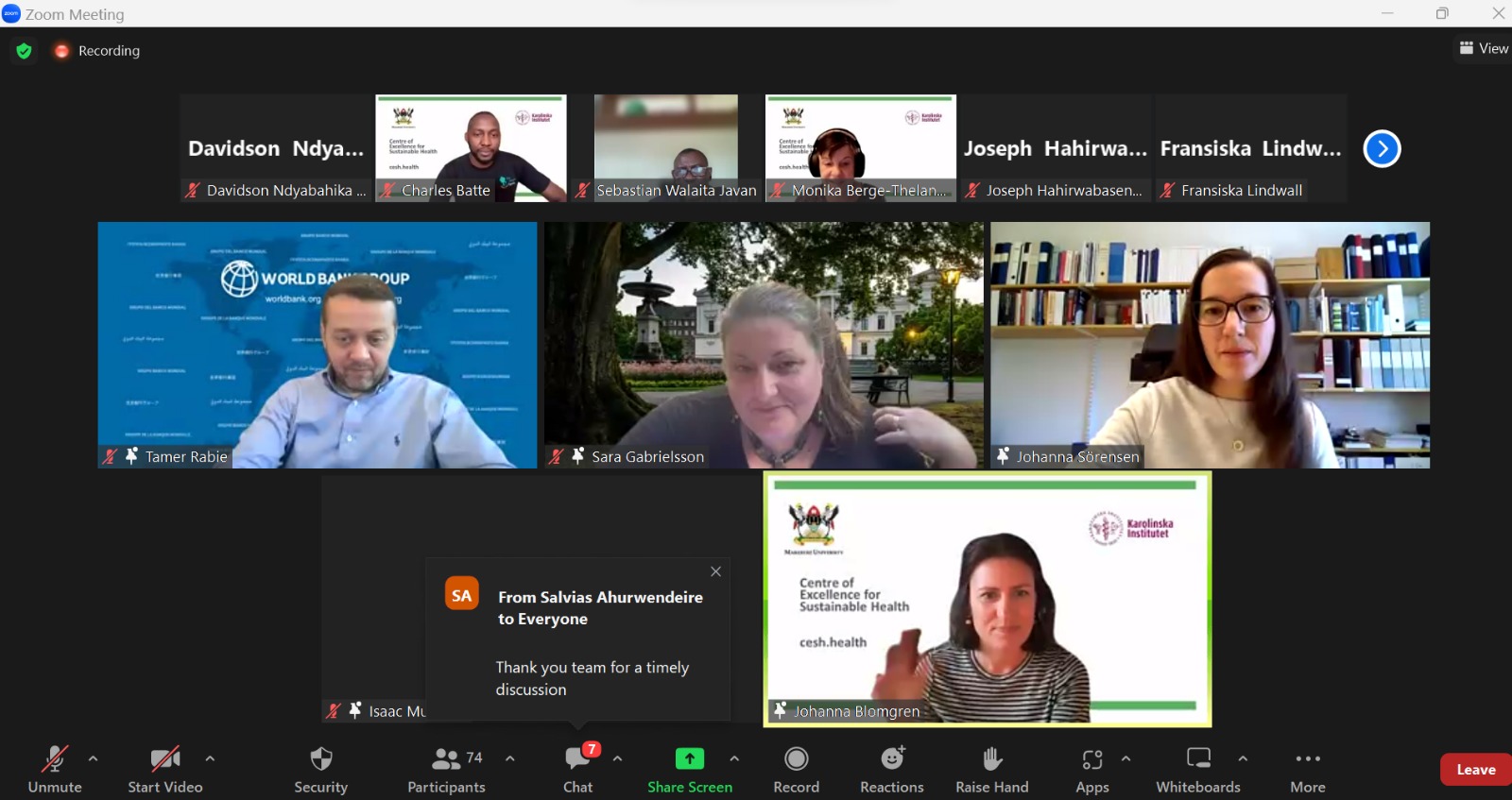
By Davidson Ndyabahika, Johanna Blomgren and Julius T. Mugaga
Experts have urged urgent action to mitigate the health risks of climate change. The 2023 global conversation, on Climate Change and Health highlighted the need for transformational action in every sector to protect people’s health from climate change.
Held on September 5, 2023 the virtual seminar, organized by the Centre of Excellence for Sustainable Health (CESH), a collaboration between Makerere University and the Karolinska Institutet that aims to increase capacity and spur action to advance the agenda for sustainable health drew over 230 attendees from all over the world. It placed emphasis on mitigating the effects of extreme weather, such flooding.
In its 2023 report, the Intergovernmental Panel on Climate Change (IPCC) notes that global terrestrial, freshwater, and ocean ecosystems have already been affected by climate change, along with the associated losses and costs. It predicts that heavy rainfall and flooding events are expected to worsen and occur more frequently in the majority of regions of Africa, Asia, North America, and Europe by 1.5°C global warming (high confidence).
The 2023 IPCC report identifies barriers that prevent people and society from implementing climate-resilient behaviors. Financial limitations, conflicts with the SDGs, inequalities, institutional, economic, and social hurdles, as well as dispersed strategies, are a few of these. The panel equally agree that if global warming exceeds 1.5 °C and the SDGs are not adequately progressed, chances for climate-resilient development would be considerably more limited.
Now, during the seminar, the panel, by consensus agreed that climate change is critical citing that such conversations on critical factors in relation to the climate and health crisis are not only timely but necessary.
Climate change impacts the social determinants of health, which include excellent health and wellbeing, by causing decreased food output, low fishing yields, flooding, and infrastructure damage, according to Daniel Helldén, a PhD student at KI Department of Global Public Health.
“The future emission scenarios are dire. What is becoming more and more clear is that climate change is a generational issue. Children born today will continue to bear the biggest burden of climate change impact,” said Helldén.
Dr. Mugume Isaac Amooti, the Director of Weather Forecasting Services at the Uganda National Meteorological Authority (UNMA), emphasized the importance of considering both long-term averages and unprecedented weather events driven by climate change. These events are thought extreme only when they exceed past records. He noted for instance that in Uganda; “The widespread flooding brought on by heavy and frequent precipitation is what we are seeing in Uganda, particularly in the cities. However, we are witnessing heat waves and cold waves at different times of the year.”
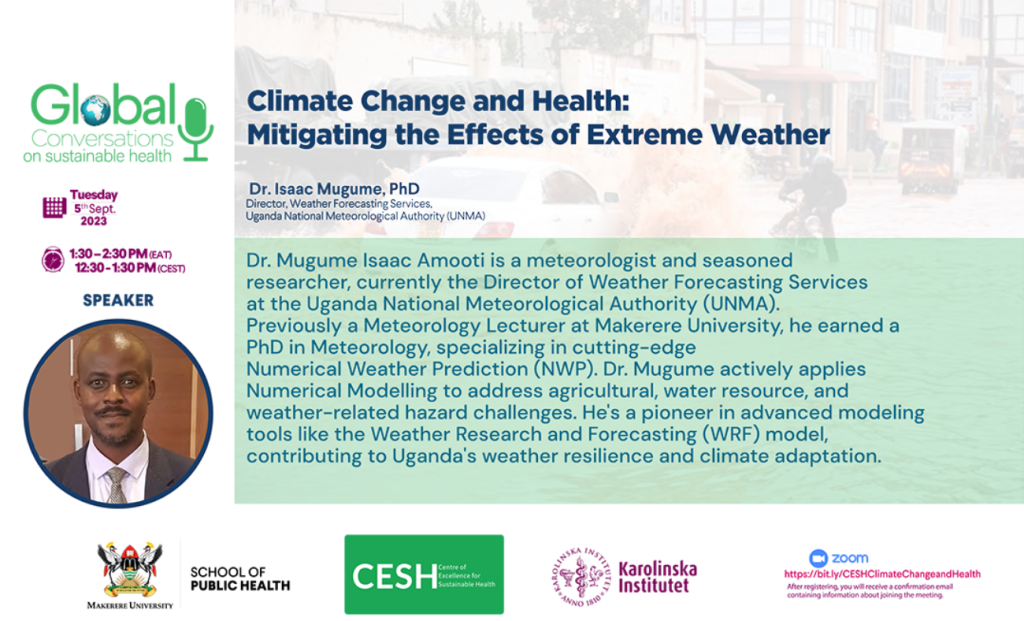
Although there isn’t a clear pattern in Sweden’s precipitation, Dr. Johanna Sörensen of Lund University in Sweden said that forecasts suggest that rainfall may increase by the end of the century. Given the flooding problems that already present, this, she says is something to worry about. “Flooding is increasing not only because of climate change but also even more that we construct the cities more densely and we construct buildings and industries on lowly areas that we used not to do in the past which is of course not a good idea.”
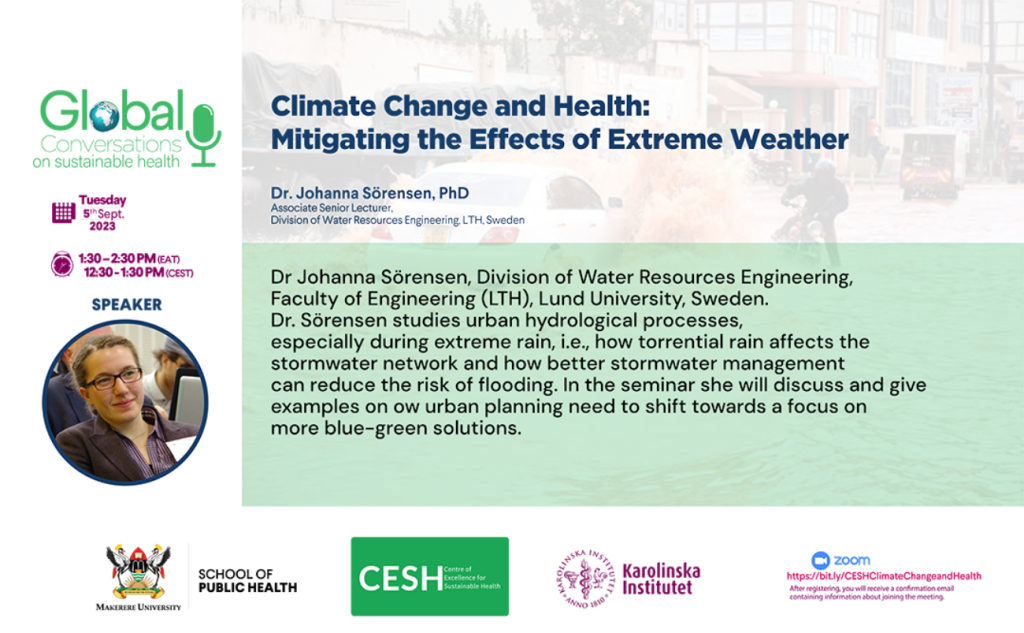
Dr. Tamer Rabie, a lead health specialist at the World Bank Group, notes that risks are amplified by climate change, which therefore has an intensified negative impact. He points out, for instance, that in order to comprehend how climate change and changes in temperature and precipitation patterns will affect health, it is critical to view climate change as a risk multiplier.
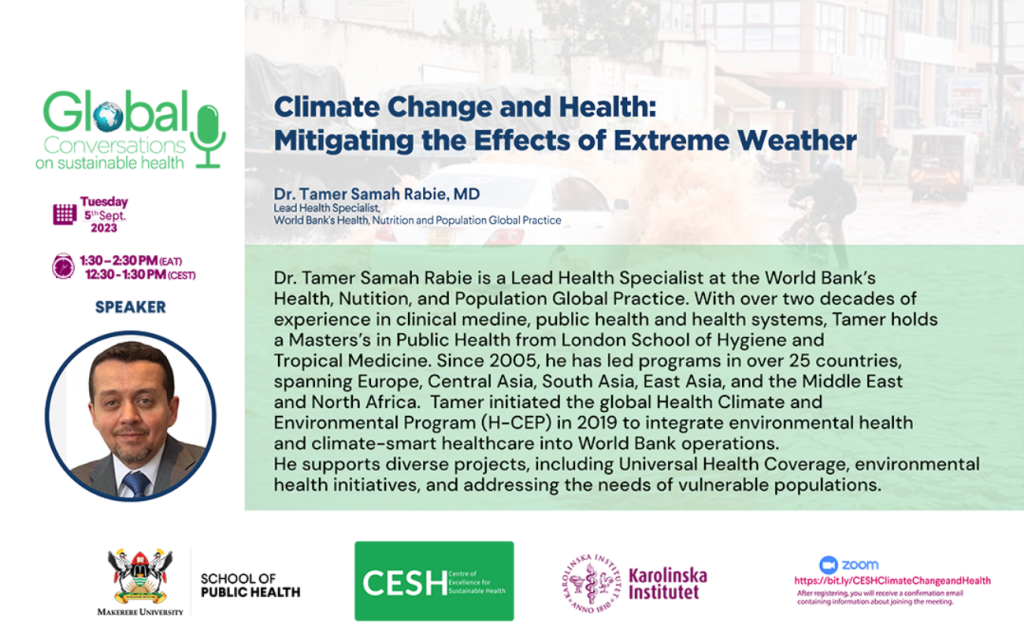
Dr. Tamer, also the architect of the World Bank’s global Health-Climate and Environment Program (H-CEP), underscored three pathways through which climate change impacts health: direct effects, indirect effects, and those mediated by ecosystems. Some of the direct pathways include issues like increased temperatures likely to lead to heat waves, heat-related illnesses, worsened non-communicable diseases, and increase in the risk of events like traumatic injuries.
According to Dr. Tamer, ecosystem-mediated risks include vector-borne diseases (like Malaria and Dengue), foodborne illnesses, and waterborne diseases (like Cholera). These risks are closely tied to how health outcomes are influenced by the ecosystem. Additionally, indirect health impacts encompass mental health due to population displacements, as well as malnutrition resulting from shifts in food production and overall food systems.
“We have done estimates in the World Bank that show that extreme weather events and climate change will lead to pushing nearly 132 million people into extreme poverty by 2030. If you look at the health impacts within those figures and the main drivers, we are seeing that nearly 44 million out of those 132 will be pushed into extreme poverty by 2030 if we don’t take any action today,” Dr. Tamer.
According to Dr. Tamer, the World Bank has conducted climate and health vulnerability assessments specifically looking at the cost of inaction moving into the 2030s and 2050s using information that relates to malaria, dengue, diarrhea, stunting in children, heat related illnesses, floods, among others.
“What we are seeing is that on average, countries will be losing anywhere between 1-5% of their GDP as a result of not really addressing the climate crisis, not being able to address these impacts that we are talking about, and obviously not investing enough into the health systems to be able to be more resilient,” Dr. Tamer noted during the webinar.
According to Dr. Sara Gabrielsson, an Associate Senior Lecturer in Sustainability Science at Lund University’s Centre for Sustainability Studies (LUCSUS), addressing immediate health risks involves containing flooding, which is just one aspect of climate change-related challenges like sea level rise and drought.
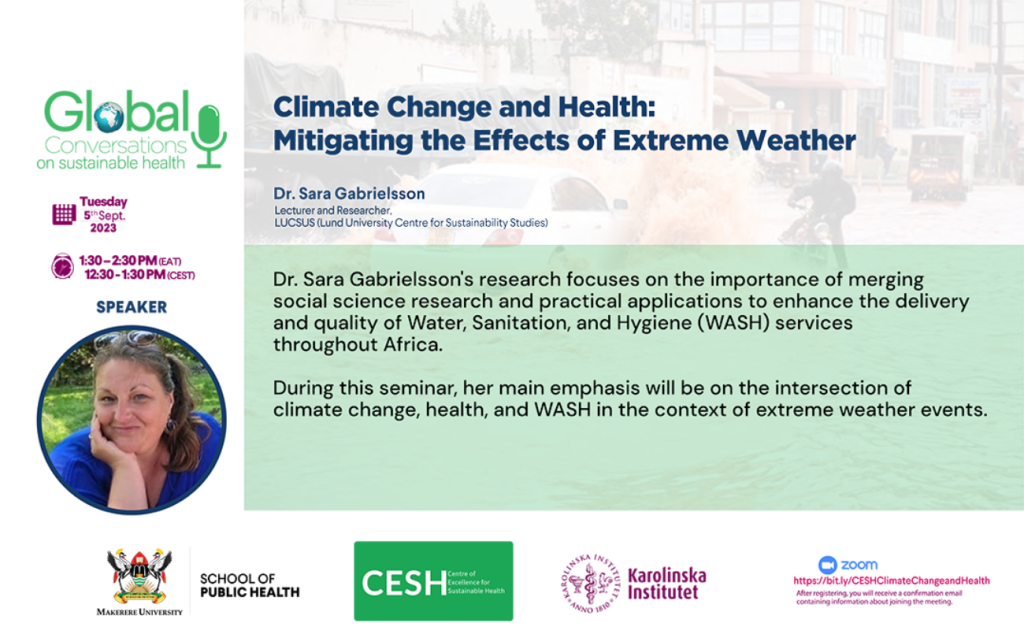
She highlights the connection between various deadly diseases like dengue, typhoid, trachoma, and cholera among others to this issue. During a crisis like flooding, treatment for these diseases she notes often takes a backseat due to the overwhelming health burdens that arise.
“There is death from drowning or direct injury from debris in these very storm surges, but then we also have the issue of just water sitting, waiting in water for longer periods, leading to lots of infections, urine-tract infections, vaginal infections, skin diseases, hypothermia, lots of those kinds of things, but also vector-borne diseases, and especially malaria, which is, of course, one big thing here,” Dr. Gabrielsson opines.
She adds that flooding brings problems like contaminated drinking water, leading to chronic diarrhea and malnutrition. Additionally, damaged sanitation facilities force people into open defecation, exposing them to harmful bacteria and further risk of chronic diarrhea.
“These immediate health risks are just the beginning. Moving into long-term risks, flooding severely impacts the availability of clean water for basic hygiene. As we’ve learned from COVID, hygiene is paramount for health. Insufficient handwashing and personal hygiene can breed disease. We need proper hygiene for preparing food, tending to babies, managing menstrual health, and more. Without it, there’s increased exposure to harmful bacteria, compounded by the use of inadequate sanitation systems, resulting in outbreaks of various diseases,” observed Gabrielsson.
Way forward
Dr. Sörensen, from a Swedish standpoint, proposes proactive steps to mitigate flooding. These include slowing down water flow, discouraging construction in flood-prone zones, and avoiding building in areas prone to heavy rain. She points out that in cities like Mumbai and Gothenburg, there has been a concerning trend of construction in flood-prone regions. Dr. Sörensen emphasizes the importance of adapting solutions for creating greener, more sustainable cities. “In China, they call it a sponge city. It’s like a sponge—you fill it up with water during rainfall and then use it later for various purposes. Utilizing vegetation and water storage helps retain water and slow down its flow in urban areas. Green spaces in cities are crucial for health, well-being, and providing shade, especially during heatwaves,” she says.
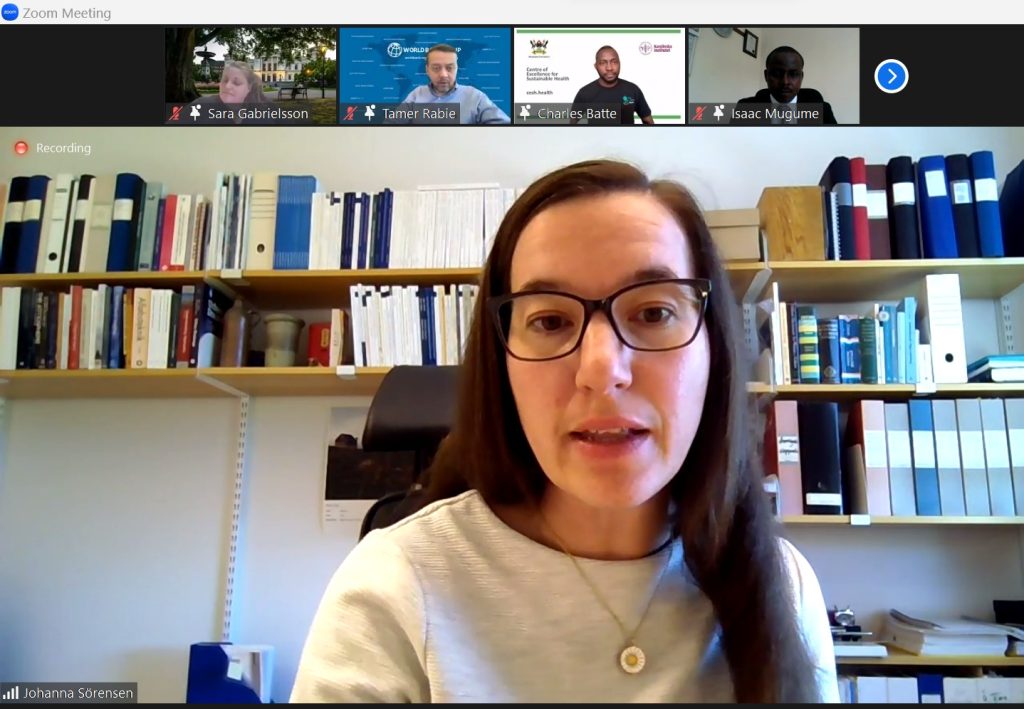
In Uganda, Dr. Mugume notes that the government has invested in weather monitoring infrastructure, including the three weather radars, which are strategically spread across the country to enable UNMA to monitor weather at any part of the country.
“With this technology, we can now offer more precise and timely services, ensuring our communities respond effectively. Weather and climate forecasts range from hourly to seasonal projections. Shorter forecasts tend to be more accurate, although longer ones still fall within manageable limits. For instance, our seasonal forecast accuracy in Uganda is at 90%, aligning with National Development Plan 3. We collaborate with development partners to fine-tune these forecasts.”
For Dr. Gabrielsson, preparedness is key, especially for the 2.2 billion people worldwide relying on sanitation systems, many of whom live in rapidly urbanizing areas and unplanned settlements.
Unfortunately, these systems often lack proper management, leading to health risks. In urban settings, she says, the spread of sludge from these systems can have widespread health implications. To address this, there’s a pressing need to prioritize climate-resilient sanitation systems. Historically, the sanitation sector has been under-prioritized, resulting in insufficient funding and political attention. Without a one-size-fits-all solution due to diverse living habits, cultural considerations become paramount. A gender-responsive approach is crucial, as women are primarily responsible for WASH (Water, Sanitation, and Hygiene) practices.
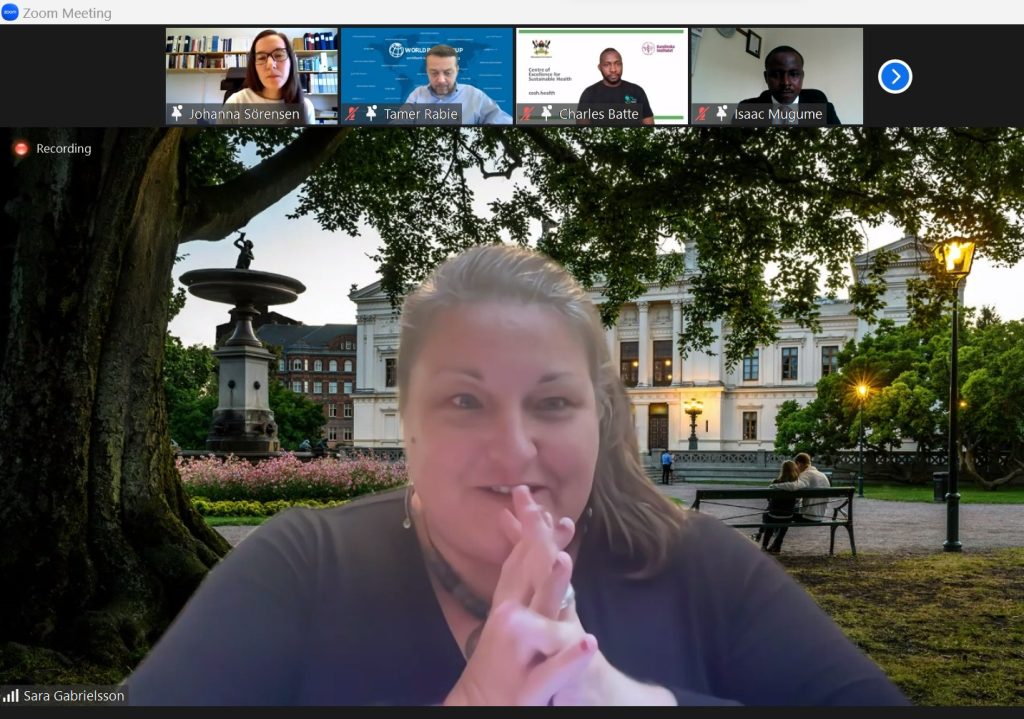
“It involves recognizing the unique needs of different groups, such as refugees, the elderly, disabled individuals, children, and menstruating individuals. Climate-resilient wash infrastructure requires community responsibility, government policy, and financial support. For instance, in flood-prone areas like the Amazon Basin, sanitation facilities are designed to align with local livelihoods, incorporating features like composting latrines that produce manure for farming and collecting rainwater for handwashing. This approach ensures environmental safety and sustainable practices,” she observes.
Dr. Gabrielsson emphasizes the importance of cultural acceptance in encouraging people’s dedication to upholding basic sanitation and hygiene practices, particularly in the face of flooding. “Another example I presented is a UNICEF-supported toilet in Bangladesh. It’s elevated with precast concrete rings to prevent flooding, sealed with concrete mortar for contamination prevention, and reinforced to withstand heavy rain and wind. This design was developed in close consultation with local communities, ensuring cultural acceptance and affordability. The goal is to create facilities that people actually want to use, which is why it’s crucial to integrate natural and social sciences for effective solutions.”
The World Bank has substantially supported action on climate change, including both adaptation and mitigation initiatives. Dr. Tamer says over $2.2 billion has been set aside as of today for climate-related health interventions, especially in South Asia and sub-Saharan Africa. Significant assistance has also been given to assist tiny island states in managing the effects of climate change, particularly extreme events.
In Yemen, the World Bank has sponsored efforts to put in place electronic early warning systems for real-time health data and policy response due to outbreaks of diseases including cholera and malaria. In Madagascar, the World Bank has funded work combining climate and nutrition programming. The World Bank worked with the government of Ghana to create long-lasting vaccine delivery networks.
You may like
-


Makerere Graduation Underscores Investment in Africa’s Public Health Capacity
-


Botswana Delegation Visits Makerere’s Public Investment Management Centre to Study Sustainable Training Model
-


Three MakSPH Faculty Honoured with Makerere University Research Excellence Awards 2026
-


Makerere University commemorates 13 transformative years of partnership with Mastercard Foundation
-


200 UVTAB students graduate: CEES emphasizes Skills, Integrity and Community Impact
-


76th Graduation Ceremony: CoBAMS Staff and Graduates Win Excellence Awards
Health
Makerere Graduation Underscores Investment in Africa’s Public Health Capacity
Published
20 hours agoon
March 4, 2026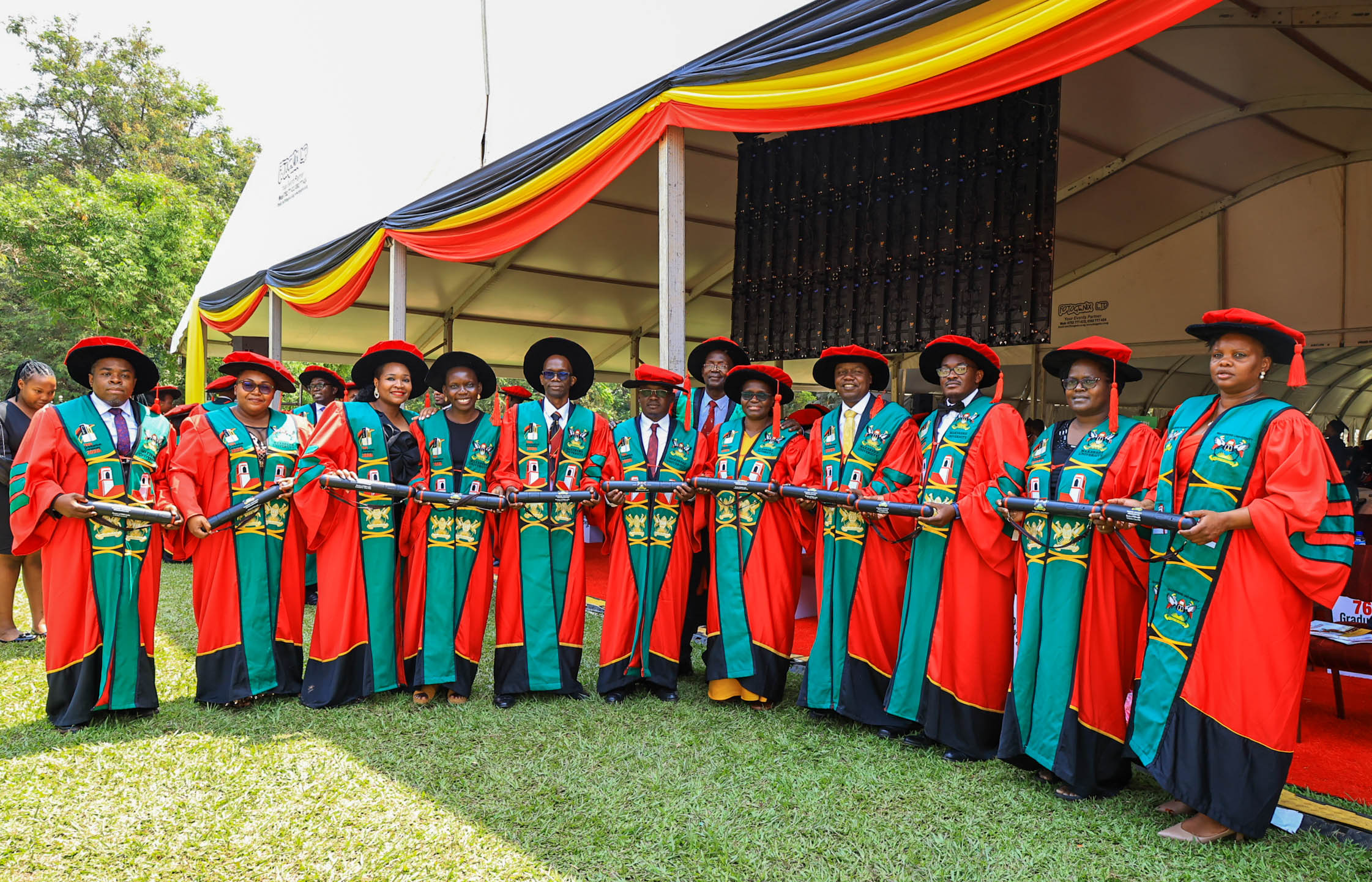
KAMPALA, 25 February 2026 — Higher education must move beyond awarding degrees to producing solutions for national and global crises, speakers said on Wednesday as Makerere University continued its 76th Graduation Ceremony, positioning universities as central actors in strengthening Africa’s public health capacity.
Addressing graduands on Wednesday, February 25, 2026, at Freedom Square, national leaders and university officials framed graduation not as a ceremonial endpoint but as an investment in workforce readiness, research leadership, and evidence-driven governance, particularly at a time when health systems across the continent face growing pressure from pandemics, demographic change, and climate-related risks.
The message resonated strongly through presentations from Makerere University School of Public Health (MakSPH) and Makerere University College of Health Sciences (MakCHS), whose graduates enter professional service amid renewed global attention to health system resilience, scientific leadership, and locally generated research.
Delivering the commencement address on Day Two of Makerere University’s 76th Graduation Ceremony, Dr. Margaret Blick Kigozi, Board Chairperson of the Makerere University Endowment Fund, reflected on her graduation in 1976 during a period of national uncertainty under then-Chancellor President Idi Amin. She recalled leaving Uganda soon after with her young family, carrying “little more than education, values, and hope,” an experience she used to frame lessons on resilience, purpose, and responsibility in uncertain times.
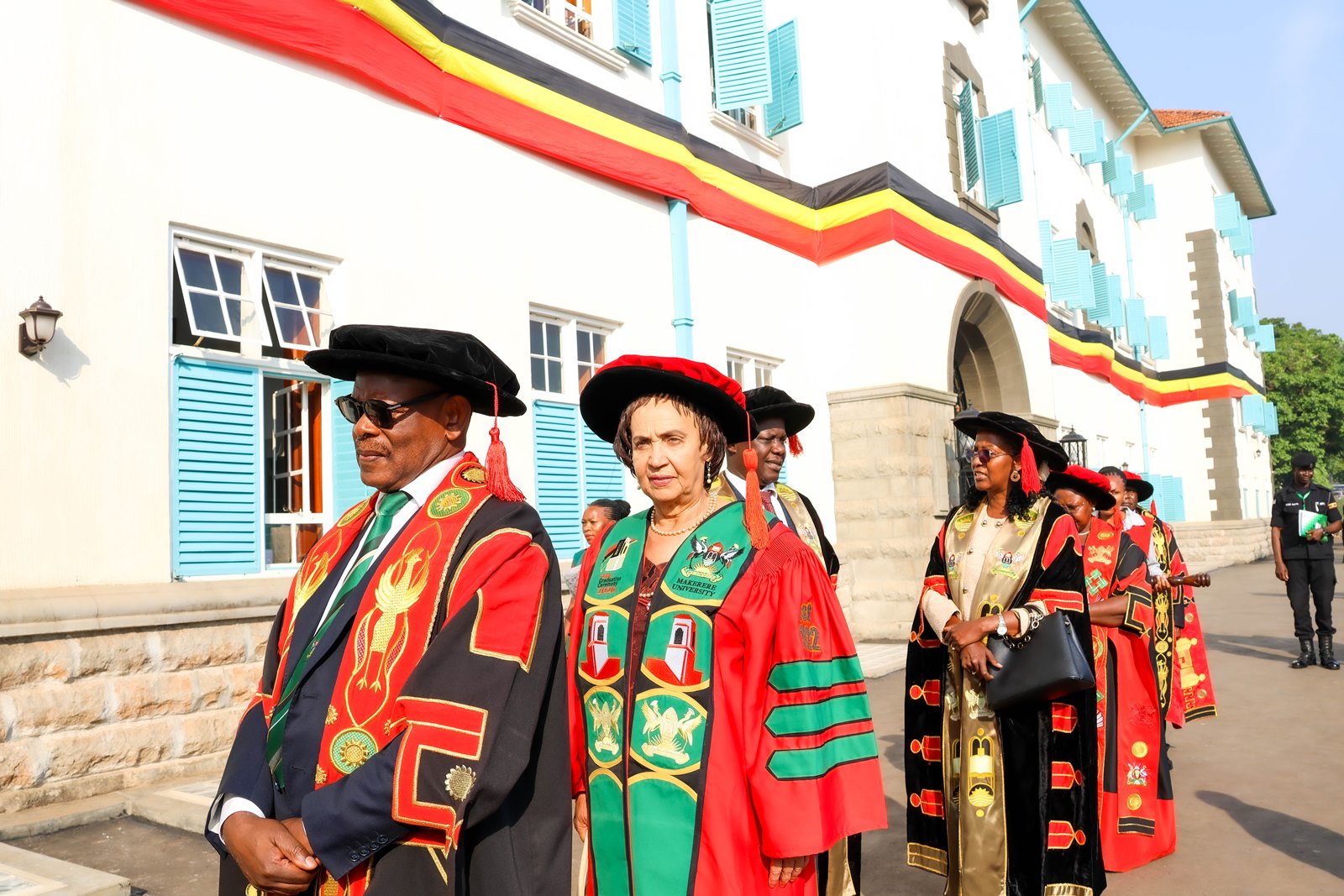
Challenging graduates to rethink professional success, she reminded those entering health and life sciences that their training carries extraordinary influence.
“Power does not make you important; it makes you responsible,” she said. “You will decide who is listened to and who is dismissed, who waits and who is rushed through, who feels safe and who feels small. Your education has trained you to ask better questions, but your humanity must guide the answers. Behind every chart, every case, every experiment, there is life, and life deserves care, patience, and dignity.”
Throughout the ceremony, speakers returned to a common refrain: societies increasingly depend on evidence, and universities must produce professionals capable of translating knowledge into policy, practice, and community impact.
Across the four-day congregation, the University will award 9,295 degrees and diplomas, including 2,503 Master’s degrees, 6,343 Bachelor’s degrees, 206 Postgraduate Diplomas, and 30 Diplomas. But beyond the numbers, speakers repeatedly returned to a central question on how higher education can translate academic growth into national development and health security.
On day two, graduands were presented from the College of Natural Sciences, the College of Veterinary Medicine, Animal Resources and Biosecurity, the College of Health Sciences, and the MakSPH, the latter positioned squarely within Africa’s ongoing struggle to expand its pool of trained epidemiologists, health systems researchers, and policy leaders.
Vice Chancellor Prof. Barnabas Nawangwe noted that Africa averages just 80 researchers per million people, compared to a global average of 1,081, warning that the human resource gap remains substantial.
“Today the School of Public Health presents graduands joining the field at a time when Africa faces a critical shortage of highly trained public health leaders,” he said.
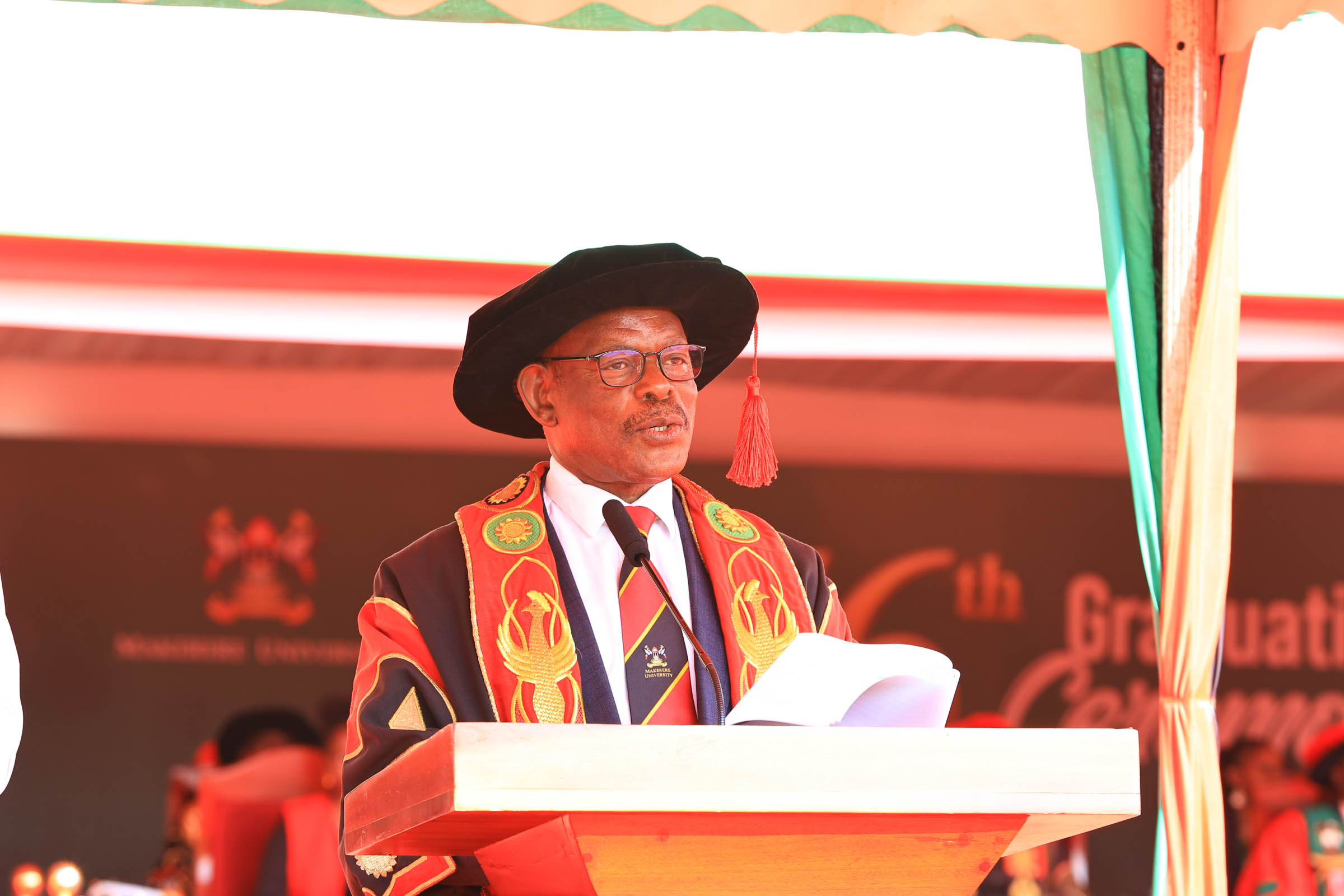
The School of Public Health presented seven PhD candidates: Aber Harriet Odonga, Komakech Henry, Lubogo David, Nakisita Olivia, Namukose Samalie, Ntaro Moses, and Osuret Jimmy. It also graduated 195 Master’s students and 29 Bachelor of Environmental Health Science graduates, including four first-class honours recipients led by Phillip Acaye with a CGPA of 4.63.
Their research spans maternal and child health, epidemic preparedness, sanitation behaviour change, nutrition systems integration, and injury prevention, areas increasingly recognised as foundational to national development rather than peripheral health concerns.
University Chancellor Dr. Crispus Kiyonga emphasized that research must move beyond academic publication into policy and implementation.
“Research plays a very vital role in the development of any community,” he said, linking university scholarship directly to Uganda’s national development agenda.

For public health education, that responsibility carries particular urgency. The COVID-19 pandemic, recurring disease outbreaks, and climate-linked health risks have exposed how deeply national stability depends on scientific capacity.
The chancellor hailed the Government of Uganda for committing UGX 30 billion through the Makerere University Research and Innovations Fund (MakRIF).
Mak Urged on More PhDs
Representing the First Lady and Minister of Education and Sports, State Minister Dr. Joyce Kaducu Moriku described doctoral training as central to Uganda’s research ambitions, noting government efforts to expand funding and modernize higher education systems.
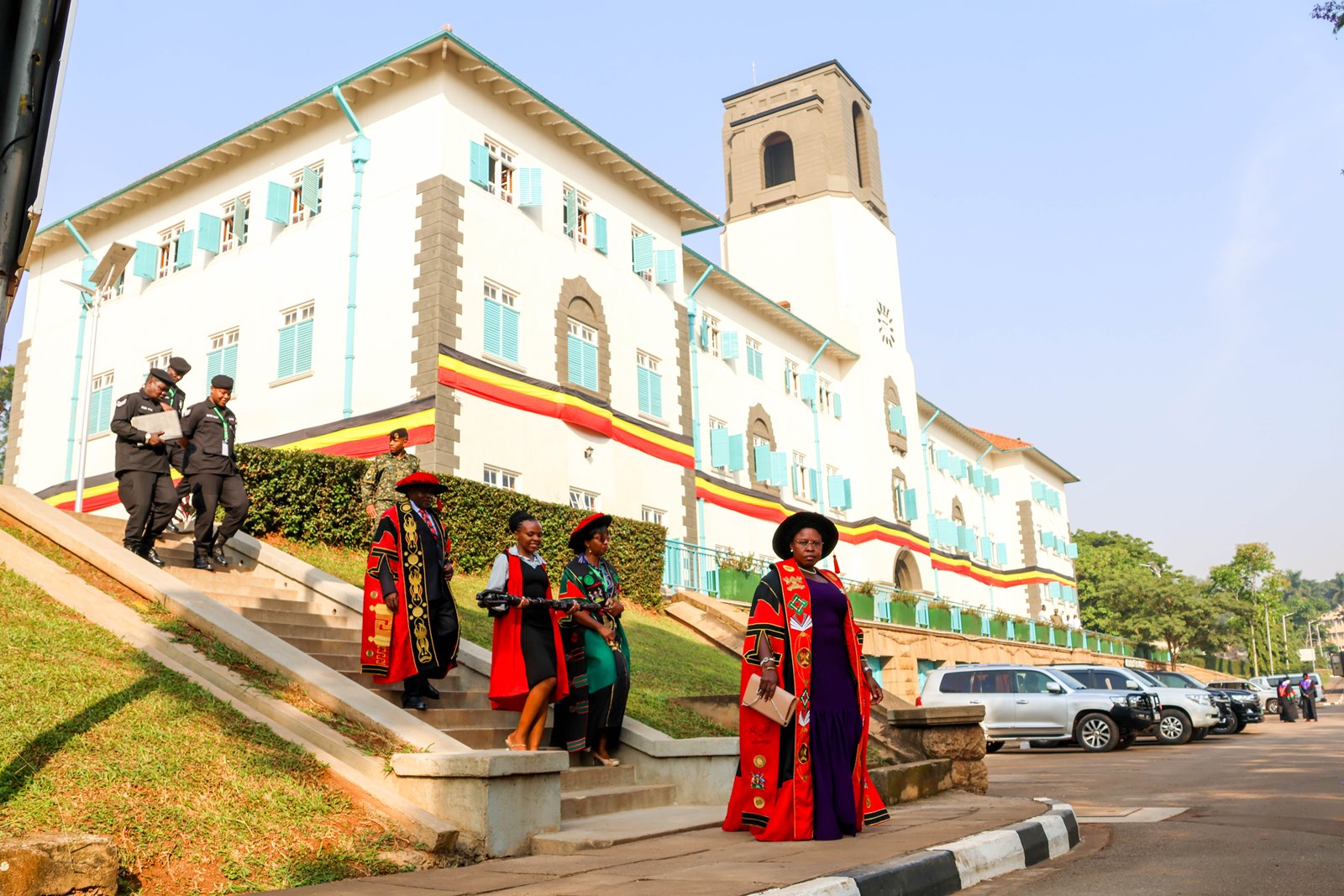
“Universities must produce more PhDs to strengthen the national research agenda,” she said, adding that competence-based reforms aim to align training more closely with societal needs.
“More PhDs also mean the university is growing in academic leadership and an increase in research. So, keep the numbers growing, especially in Science, Technology, and Engineering,” she added.
The 213 PhDs conferred this year, a record, signal more than institutional expansion but a response to structural deficits.
Africa bears approximately 25% of the global disease burden but produces a disproportionately small share of global health research. The continent’s research density remains far below global averages. In this context, each doctoral graduate becomes not merely an academic achievement but a strategic asset.
A University Responding to Its Moment
For the School of Public Health, the graduation reflects a broader evolution in how public health training is conceived. Rather than focusing solely on the treatment of disease, the field increasingly addresses systems, sanitation, nutrition, behavioural change, surveillance, prevention, and climate change, areas where research directly shapes everyday life.
Recent MakSPH-led initiatives, including national HIV impact surveys and digital health system expansion, demonstrate how academic institutions increasingly function as implementation partners to the government rather than observers.
Over the past five years, MakSPH has supported the national scale-up of electronic medical records through the CDC-funded Monitoring and Evaluation Technical Support (MakSPH-METs) programme, and led the Third Uganda Population-Based HIV Impact Assessment (UPHIA 2024–2025), the first fully Ugandan-implemented national survey of its kind.
Launched in 2020, the METs program has supported the nationwide scale-up of UgandaEMR+, transitioning thousands of facilities to secure electronic medical records and deploying critical ICT infrastructure. In March 2026, these systems will be formally transitioned to the Ministry of Health, reflecting sustainable national ownership.
Health
Three MakSPH Faculty Honoured with Makerere University Research Excellence Awards 2026
Published
2 days agoon
March 2, 2026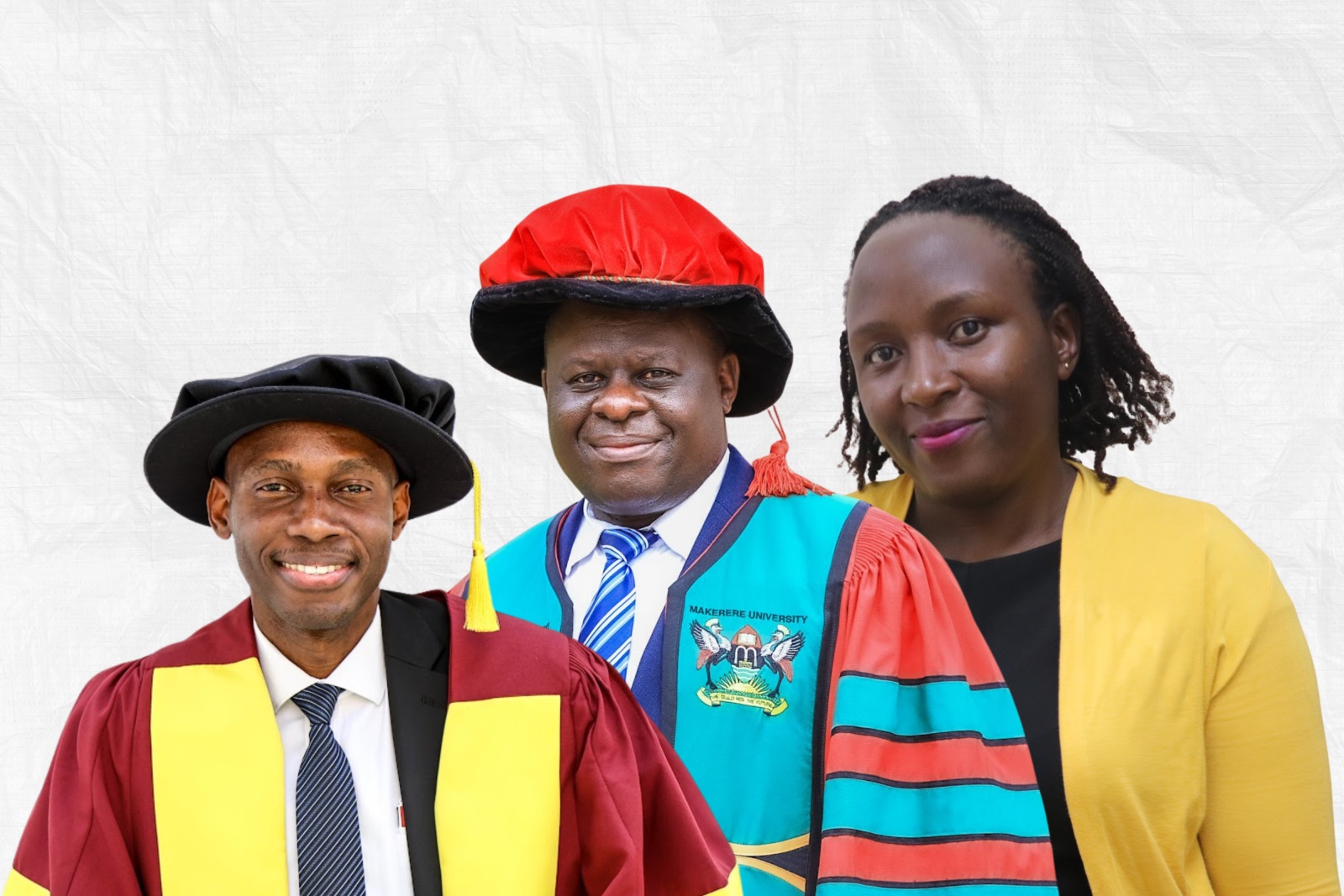
KAMPALA—Three faculty members from Makerere University School of Public Health (MakSPH) have been recognised at the Makerere University Vice-Chancellor’s Research Excellence Awards 2026, highlighting the School’s expanding contribution to research leadership, scientific productivity, and policy-relevant scholarship across Africa.
Associate Professor Peter Kyobe Waiswa, Associate Professor David Musoke, and Juliana Namutundu received honours during the University’s 76th Graduation Ceremony at Freedom Square, where Makerere celebrated scholars whose work has demonstrated exceptional research achievement and impact beyond academia.

The annual awards, coordinated by the Directorate of Research, Innovation and Partnerships (DRIP), recognise faculty and staff whose scholarly output and leadership advance Makerere University’s ambition to become a research-led institution.
“This recognition celebrates sustained excellence in research productivity and contributions to knowledge that advance both national and global discourse,” Vice-Chancellor Prof. Barnabas Nawangwe said. “We are strengthening a culture where research does not remain confined to journals but translates into solutions for society.”
Among the university’s top researchers was Assoc. Prof. Peter Kyobe Waiswa, a health systems scientist whose work focuses on maternal, newborn, and child health. Waiswa ranked among Makerere’s overall top researchers after publishing 43 peer-reviewed papers in 2025, tying with three-time award winner Prof. Moses Kamya of the School of Medicine in the College of Health Sciences.
His research examines how health systems function at their most fragile moments, including childbirth, early life, and community-level care, addressing questions of equity, service delivery, and health system performance across Africa.
Also recognised was Dr. David Musoke, an Associate Professor of Disease Control, whose 25 publications earned distinction among senior career researchers. His work spans environmental health, community health systems, and implementation research, areas increasingly viewed as critical to preventing disease before it reaches hospitals.
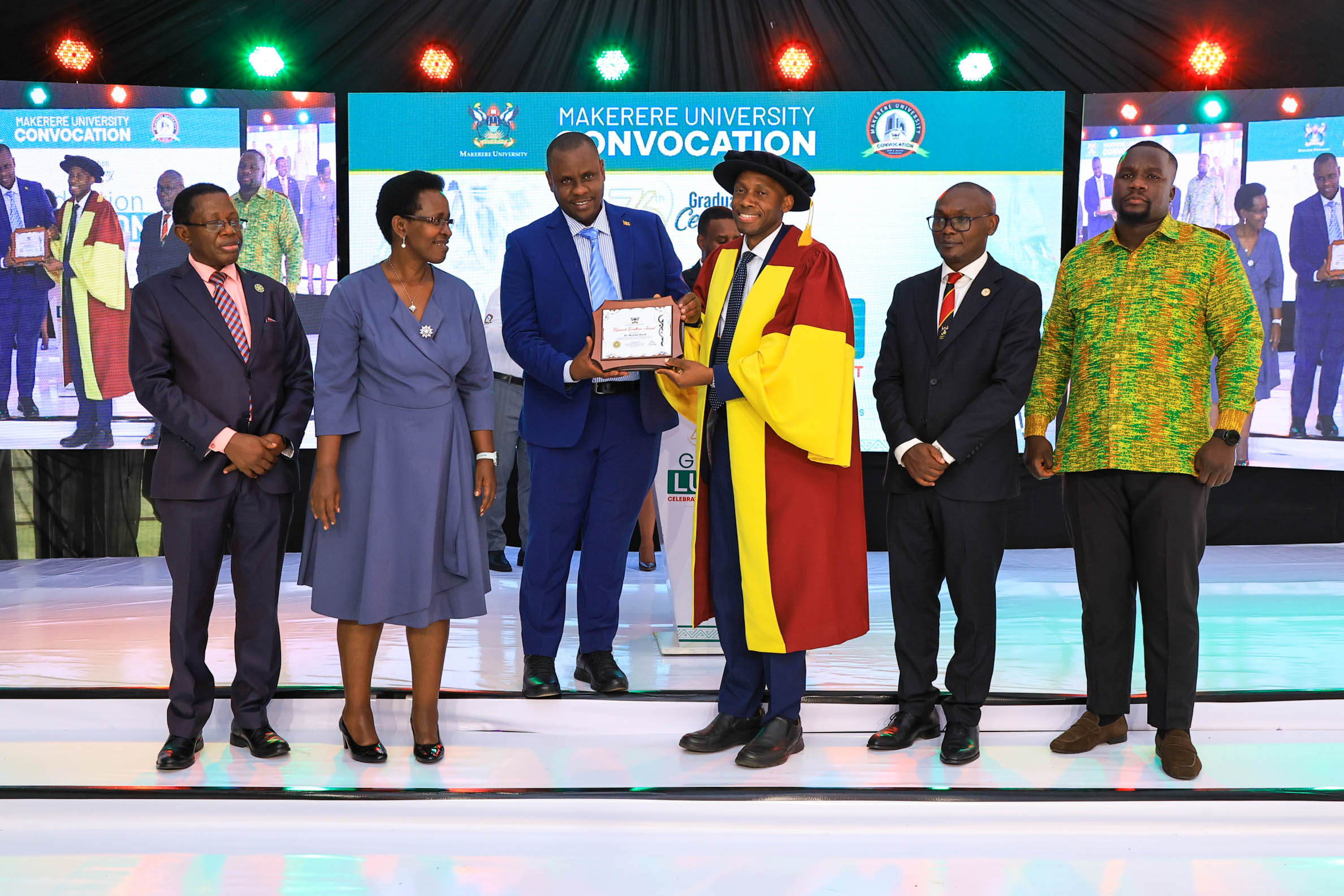
In the early-career category, Juliana Namutundu received recognition for emerging research leadership, reflecting Makerere’s effort to nurture the next generation of African scholars.
Together, the awards underscored MakSPH’s growing influence within Makerere’s research ecosystem, particularly in fields linking science directly to population wellbeing.
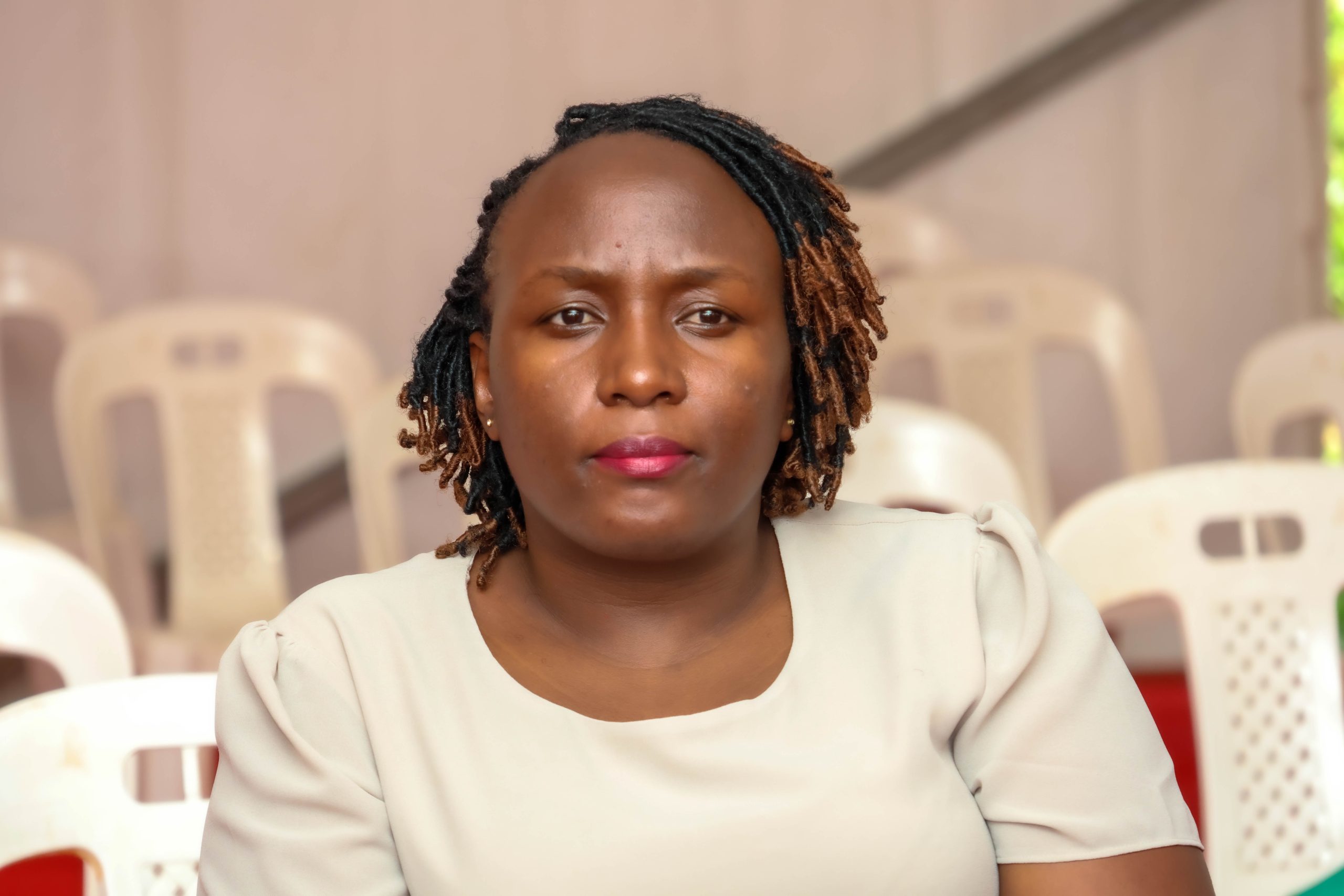
The Research Excellence Awards were established to encourage publication in high-impact journals while reinforcing Makerere’s ambition to become a globally competitive research university. Nominations are reviewed by the Board of Research and Graduate Training, chaired by Deputy Vice-Chancellor (Academic Affairs) Prof. Sarah Ssali.
Awardees were honoured during a graduation luncheon organised by the Makerere University Convocation, the institution’s alumni and staff association, which described the event as a celebration of “excellence and inspiring impact.”
The ceremony also recognised forms of scholarship extending beyond traditional academic publishing.
Dr. Geofrey Musinguzi, a research associate at the School of Public Health, was honoured for his book My Journey with Rectal Cancer, an account of diagnosis, treatment, and recovery that blends personal testimony with public health advocacy.
Diagnosed at age 44 while a visiting scholar at the University of Antwerp in Belgium, Musinguzi sought medical care after experiencing persistent symptoms, including rectal bleeding and back pain. His treatment involved surgeries, chemotherapy, radiotherapy, and a year living with a colostomy bag.
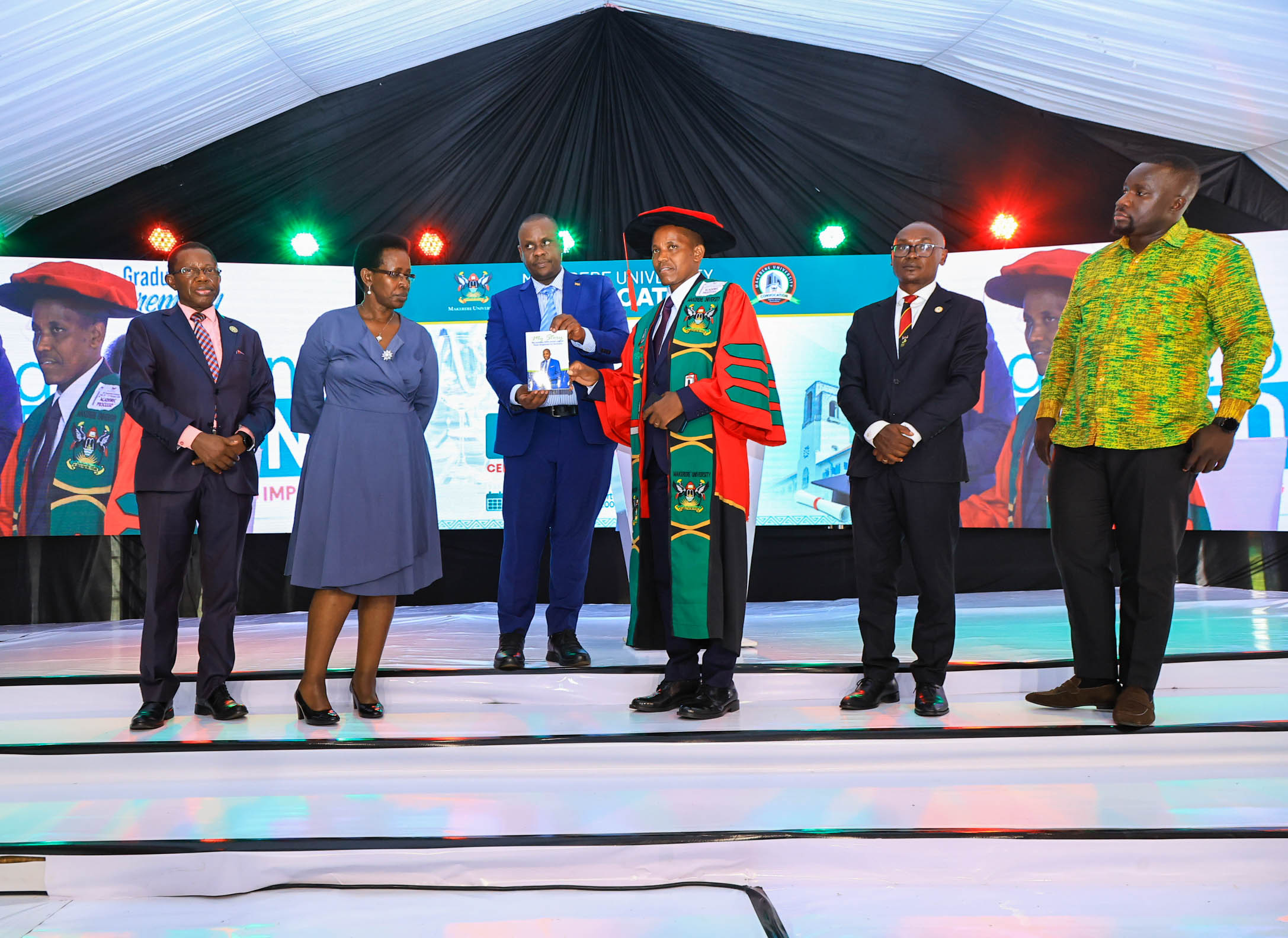
Rather than keeping the experience private, he documented it publicly to challenge cancer stigma and encourage early screening. The book, launched at the School of Public Health in August 2024, highlights how lived experience can shape public health awareness alongside scientific research.
The recognition reflects a broader understanding of research impact, one that includes scholarship capable of influencing behaviour as well as policy.
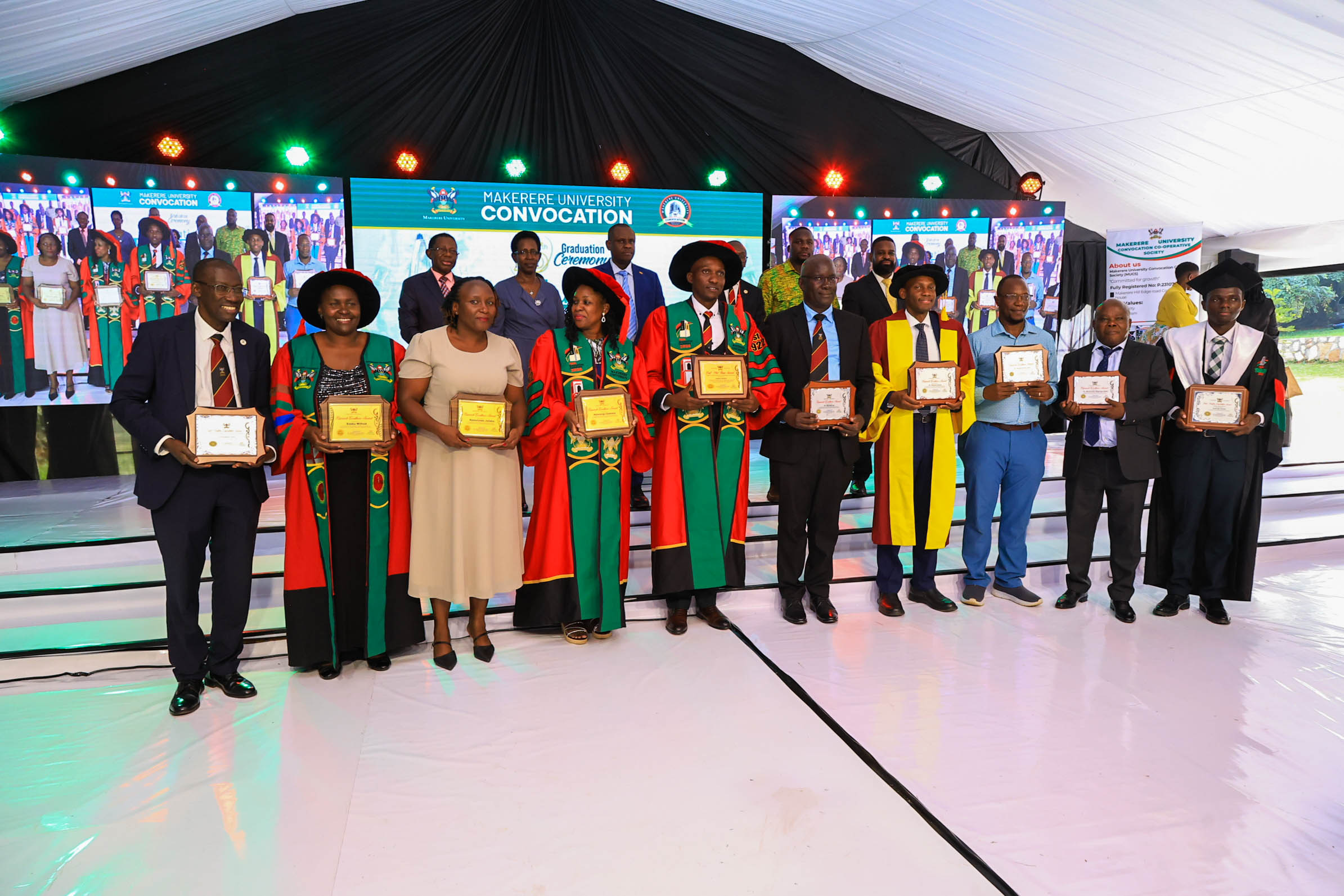
Makerere’s emphasis on research excellence comes as African universities face increasing pressure to produce locally grounded evidence while competing globally for visibility and funding. For MakSPH, whose work spans disease surveillance, environmental health, and health systems research, publication output increasingly serves as both academic currency and development infrastructure.
“These awards are part of our broader effort to position Makerere as a truly research-led institution,” Nawangwe said, adding that scholarship must remain aligned with national and regional priorities.
Health
Makerere’s 76th Graduation Ceremony: CHS showcases research strength with 26 PhD Graduates
Published
7 days agoon
February 26, 2026By
Zaam Ssali
The second day of the Makerere University 76th Graduation Ceremony, held on Wednesday 25th February, marked another proud moment as the institution continues its tradition of academic excellence and national service. Graduands were presented for conferment of degrees and award of diplomas from the College of Health Sciences (CHS), College of Natural Sciences, College of Veterinary Medicine, Animal Resources and Biosecurity and School of Public Health.
The College of Health Sciences presented a total of 746 graduands for conferment of degrees including 26 PhD, 293 Masters, 425 Bachelors and 2 Diplomas. This is a testament to CHS and Makerere University’s contribution in training skilled health professionals and strengthening Uganda’s health systems through education, innovation and research.
Speaking to the congregation, Professor Barnabas Nawangwe – Vice Chancellor, Makerere University welcomed everyone to Day 2 of Makerere University’s 76th Graduation. He congratulated the 9,295 graduands comprising 4,262 (46%) female graduates and 5,033 (54%) male graduands who will be awarded degrees and diplomas through the graduation week; 213 graduands are PhD recipients. He commended the efforts of staff, parents, and sponsors in supporting the students’ journeys.
He reminded the congregation that outstanding researchers were honored on Day 1 of the graduation for excellence in scholarly work and impactful publications, reaffirming the University’ commitment to research productivity and academic distinction. In addition, the Innovation Commercialization Award was also presented, highlighting Makerere’s focus on turning research into practical solutions that address real-world challenges and drive national development.
The Vice Chancellor highlighted the history of the College established in 1924 cognizant of its impact on Uganda’s Health sector and beyond. He said, ‘As the College enters its second century, it is strengthening specialist training to address increasingly complex health challenges’. CHS has introduced fellowship programmes to equip physicians with advanced expertise which are useful in transforming health systems across Uganda and the region. In 2025 alone, 16 fellows graduated in Pediatric Hematology and Oncology, with additional fellowships underway in Newborn Health, Interventional Radiology, Emergency Care Medicine, and Pulmonary and Critical Care Medicine.
Professor Nawangwe also noted the progression of one of the centres of excellence at CHS, the Makerere University Lung Institute (MLI) established a decade ago to address the growing burden of lung disease in Uganda. He said, ‘today, the MLI serves 6,000 patients annually, shapes national policy and has embarked on construction of a new building, signalling a renewed commitment to advancing respiratory health in Uganda and beyond’.
He also reminded the congregation that CHS continues its centennial celebrations, including the upcoming Alumni Dinner Gala on March 6th 2026 to raise funds for refurbishing the iconic Davis Lecture Theatre, culminating in the unveiling of a Centennial Monument later this year.
Professor Nawangwe applauded the steady advancement of Makerere University into a research-led institution, generating knowledge that drives communities, strengthens industries, and advances national transformation.
Professor Maggie Kigozi was the commencement speaker for Day 2. Professor Kigozi, a distinguished alumna reflected on how her time at Makerere University shaped her life, career, and values, recalling her graduation in 1976 during a period of national uncertainty. Forced to leave Uganda soon after with little more than her education and determination, she noted that her Makerere training opened doors across the region, enabling her to serve in leading health institutions in Zambia, Kenya, and Uganda. Addressing the graduands, she emphasized that their Makerere education remains a powerful passport to opportunity and carries with it the responsibility to uphold excellence and integrity wherever they serve.
She urged graduates in the health and life sciences to handle the power of their profession with humility, compassion, and responsibility, reminding them that behind every patient, case, or experiment lies a life deserving dignity. Beyond clinical expertise, she encouraged them to develop business and financial skills to build sustainable health services and create opportunities for others. She also reassured them that failure is part of growth, noting that resilience, continuous learning, and balance in life are essential to meaningful success as they step forward as ambassadors of the Makerere legacy.
Delivering a speech on behalf of the First Lady and Minister of Education and Sports, Janet Kataha Museveni, the State Minister for Primary Education, Hon. Dr. Joyce Moriku Kaducu, said the Government had deliberately deepened investment in higher education to position universities as drivers of national development.
Hon. Kaducu described the establishment of the Makerere University Research and Innovation Fund (RIF) as a major milestone, noting that it supports high-impact research aligned to national priorities and has enabled thousands of researchers to deliver practical solutions benefiting communities across Uganda. She also highlighted Parliament’s approval of a 162 million US dollar concessional loan from the Korea EXIM Bank to upgrade science, technology and innovation infrastructure at Makerere University, including modern laboratories, smart classrooms and advanced facilities for engineering and health sciences, to better prepare students for the Fourth Industrial Revolution.
The Minister announced plans to construct a national stadium at Makerere and other higher education institutions to promote sports development and talent identification. She reiterated the directive for all universities to fully implement Competence-Based Education and Training by July 2027, urging Makerere to lead curriculum reform, staff training and infrastructure development while ensuring satellite campuses meet full accreditation and uphold academic standards, transparency and accountability.
Addressing graduates, Hon. Kaducu encouraged them to become job creators in sectors such as agriculture, infrastructure, healthcare and education, and to leverage opportunities like the Parish Development Model for entrepreneurship. She commended Makerere’s leadership and partners and congratulated the Class of 2026 on their achievement.
In his address to the congregation, Dr. Crispus Kiyonga – Chancellor, Makerere University congratulated graduands upon making it to the 76th Graduation Ceremony of Makerere University. He described their achievement as a milestone in both personal growth and national development, urging them to apply their knowledge creatively to benefit society. He acknowledged the contribution of academic staff, administrators, the University Council, and expressed gratitude to the Government of Uganda and President Yoweri Kaguta Museveni for continued support.
Dr. Kiyonga called on the university community to strengthen research, expand private sector partnerships, and leverage technology to address Uganda’s development challenges. Emphasising research as central to national progress, Dr. Kiyonga noted the Government’s UGX 30 billion investment annually in the Makerere University Research and Innovation Fund (MakRIF) and praised the Science, Technology and Innovation Secretariat, Office of the President for supporting initiatives at the University advancing homegrown solutions to national challenges. He also highlighted a strengthened partnership with the Korean government, securing a USD 162 million loan from the Korea Exim Bank to boost infrastructure and staff capacity.
While acknowledging limited formal employment opportunities, he encouraged graduates to innovate and create jobs. He further commended the university’s digitalization efforts and outlined four priorities: increased research funding, private sector collaboration, community engagement, and effective use of technology.
During the 76th graduation ceremony running from the 24th -27th February, 2026, a total of 9,295 graduands will be awarded degrees and diplomas in various disciplines. Of these, 213 will receive PhDs, 2,503 Masters Degrees, 206 postgraduate Diplomas, 6343 Bachelor’s Degrees and 30 Diplomas. 46% of the graduands are female and 54% are male.
Trending
-

 Humanities & Social Sciences1 week ago
Humanities & Social Sciences1 week agoMeet Najjuka Whitney, The Girl Who Missed Law and Found Her Voice
-

 General1 week ago
General1 week ago76th Graduation Highlights
-

 Agriculture & Environment2 weeks ago
Agriculture & Environment2 weeks agoUganda Martyrs Namugongo Students Turn Organic Waste into Soap in an Innovative School Project on Sustainable Waste Management
-

 Health2 weeks ago
Health2 weeks agoMakerere University School of Public Health Graduates First Cohort of Cost-Effectiveness Analysis Short Course
-

 Agriculture & Environment1 week ago
Agriculture & Environment1 week agoCAES Presents Overall Best Performing Student in the Sciences & a Record 28 PhDs at the 76th Graduation Ceremony
